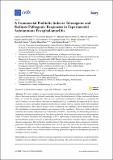Por favor, use este identificador para citar o enlazar a este item:
http://hdl.handle.net/10261/209443COMPARTIR / EXPORTAR:
 SHARE SHARE
 CORE
BASE CORE
BASE
|
|
| Visualizar otros formatos: MARC | Dublin Core | RDF | ORE | MODS | METS | DIDL | DATACITE | |

| Título: | A commercial probiotic induces tolerogenic and reduces pathogenic responses in experimental autoimmune encephalomyelitis |
Autor: | Calvo-Barreiro, Laura; Eixarch, Herena; Ponce-Alonso, Manuel; Castillo, Mireia; Lebrón-Galán, Rafael; Mestre, Leyre CSIC ORCID ; Guaza, Carmen CSIC ORCID ; Clemente, Diego; Campo, Rosa del; Montalbán, Xavier; Espejo, Carmen | Palabras clave: | Gut microbiota Probiotics Immune regulation experimental autoimmune encephalomyelitis Multiple sclerosis Adaptive immunity Antigen presenting cells Gut microbiome |
Fecha de publicación: | 7-abr-2020 | Editor: | Multidisciplinary Digital Publishing Institute | Citación: | Cells 9(4): 906 (2020) | Resumen: | Previous studies in experimental autoimmune encephalomyelitis (EAE) models have shown that some probiotic bacteria beneficially impact the development of this experimental disease. Here, we tested the therapeutic effect of two commercial multispecies probiotics—Lactibiane iki and Vivomixx—on the clinical outcome of established EAE. Lactibiane iki improves EAE clinical outcome in a dose-dependent manner and decreases central nervous system (CNS) demyelination and inflammation. This clinical improvement is related to the inhibition of pro-inflammatory and the stimulation of immunoregulatory mechanisms in the periphery. Moreover, both probiotics modulate the number and phenotype of dendritic cells (DCs). Specifically, Lactibiane iki promotes an immature, tolerogenic phenotype of DCs that can directly induce immune tolerance in the periphery, while Vivomixx decreases the percentage of DCs expressing co-stimulatory molecules. Finally, gut microbiome analysis reveals an altered microbiome composition related to clinical condition and disease progression. This is the first preclinical assay that demonstrates that a commercial probiotic performs a beneficial and dose-dependent effect in EAE mice and one of the few that demonstrates a therapeutic effect once the experimental disease is established. Because this probiotic is already available for clinical trials, further studies are being planned to explore its therapeutic potential in multiple sclerosis patients. | Versión del editor: | https://doi.org/10.3390/cells9040906 | URI: | http://hdl.handle.net/10261/209443 | DOI: | 10.3390/cells9040906 | E-ISSN: | 2073-4409 |
| Aparece en las colecciones: | (IC) Artículos |
Ficheros en este ítem:
| Fichero | Descripción | Tamaño | Formato | |
|---|---|---|---|---|
| commercial_probiotic_autoimmune_encephalomyelitis.pdf | 4,23 MB | Adobe PDF |  Visualizar/Abrir |
CORE Recommender
PubMed Central
Citations
18
checked on 15-abr-2024
SCOPUSTM
Citations
30
checked on 11-abr-2024
WEB OF SCIENCETM
Citations
29
checked on 26-feb-2024
Page view(s)
162
checked on 15-abr-2024
Download(s)
108
checked on 15-abr-2024

